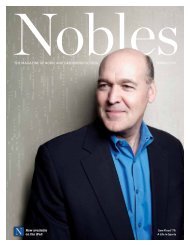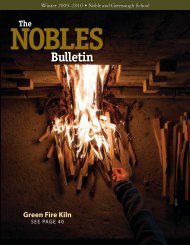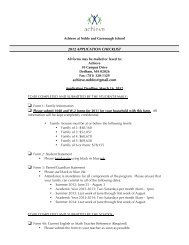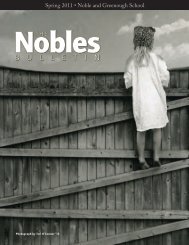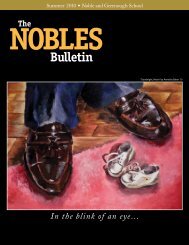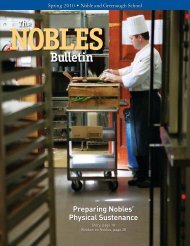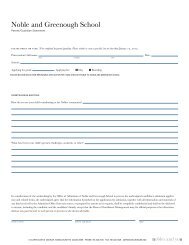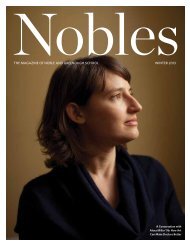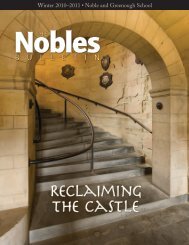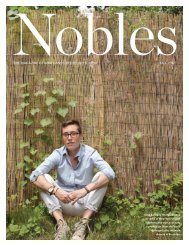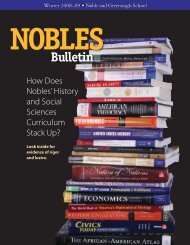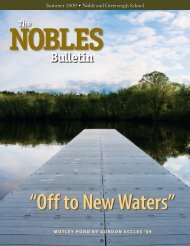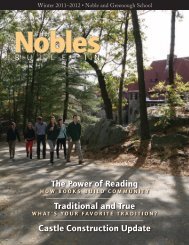B u l l e t i n - Noble and Greenough School
B u l l e t i n - Noble and Greenough School
B u l l e t i n - Noble and Greenough School
You also want an ePaper? Increase the reach of your titles
YUMPU automatically turns print PDFs into web optimized ePapers that Google loves.
castle<br />
Pulitzer Prize Winner speaks<br />
E.O. Wilson, one of the world’s most<br />
distinguished scientists, spoke at Assembly<br />
in Lawrence Auditorium Jan. 11.<br />
Wilson is a professor <strong>and</strong> honorary curator<br />
in entomology at Harvard. In<br />
1975, he published Sociobiology: The<br />
New Synthesis, a work that features ants<br />
<strong>and</strong> attempts to explain human social<br />
behaviors such as aggression <strong>and</strong> altruism.<br />
Fred Sculco, retired <strong>Noble</strong>s science<br />
teacher, introduced Wilson. “It is a distinct<br />
pleasure,” he said. “[But] how do<br />
you summarize a man who st<strong>and</strong>s as<br />
tall as any redwood in the forest?”<br />
Wilson, a two-time Pulitzer Prizewinning<br />
author, shared with the <strong>Noble</strong>s<br />
community tales from his latest adventure<br />
in the South Pacific, where he<br />
partnered with French <strong>and</strong> German<br />
scientists on the largely unexplored isl<strong>and</strong>s<br />
of New Caledonia <strong>and</strong> Vanuatu.<br />
There, Wilson, who has identified<br />
thous<strong>and</strong>s of new species <strong>and</strong> named<br />
450 of them, saw for the first time the<br />
rare kagu, a flightless bird <strong>and</strong> the only<br />
surviving member of the genus Rhynochetos.<br />
He also found an ancient <strong>and</strong><br />
aggressive ant, the Myrmecia or bull<br />
ant. Wilson called it “an ant worth our<br />
attention—a primitive species.”<br />
He suggested that humans have destabilized<br />
a beautiful planet <strong>and</strong> that a<br />
cultural shift is required—sustainability<br />
must be valued. He pointed to Costa<br />
Rica as one nation that has systematically<br />
prioritized natural resources <strong>and</strong><br />
education.<br />
Wilson also talked about the potential<br />
to eradicate genetic diseases, the<br />
ethical dilemmas that will come with<br />
genetic manipulation, his view on religious<br />
creation stories, the desirability of<br />
the distribution of human genotypes,<br />
<strong>and</strong> genetically modified agriculture.<br />
NEWS, THEATRE, SPORTS AND MORE<br />
e.o. Wilson<br />
traNsformiNg a<br />
CouNtry<br />
At Assembly on Feb. 8, <strong>Noble</strong>s<br />
welcomed author <strong>and</strong> Pulitzer<br />
Prize-winning journalist Isabel<br />
Wilkerson. Wilkerson talked about<br />
the Great Migration—the move of<br />
6 million Southern blacks to the North<br />
<strong>and</strong> the subject of her New York Times<br />
bestseller, The Warmth of Other Suns.<br />
For the book, which won the National<br />
Book Critics Circle Award <strong>and</strong><br />
other honors, Wilkerson spent 15 years<br />
researching the post-WWI period. She<br />
interviewed 1,200 people; the final narrative<br />
highlights the journeys of three<br />
Southern blacks.<br />
She said that the migrations changed<br />
the country demographically <strong>and</strong> allowed<br />
for new lineages. She noted that<br />
cultural icons whose parents were part<br />
of the migration—Diana Ross, Michael<br />
Jackson, Toni Morrison—would not<br />
have been born had their families not<br />
made a courageous, individual decision<br />
to flee the oppression.<br />
“Any migration can be judged by<br />
what happens to the children,” she said.<br />
isabel Wilkerson<br />
the <strong>Noble</strong>s bulletiN spring 2012 3



